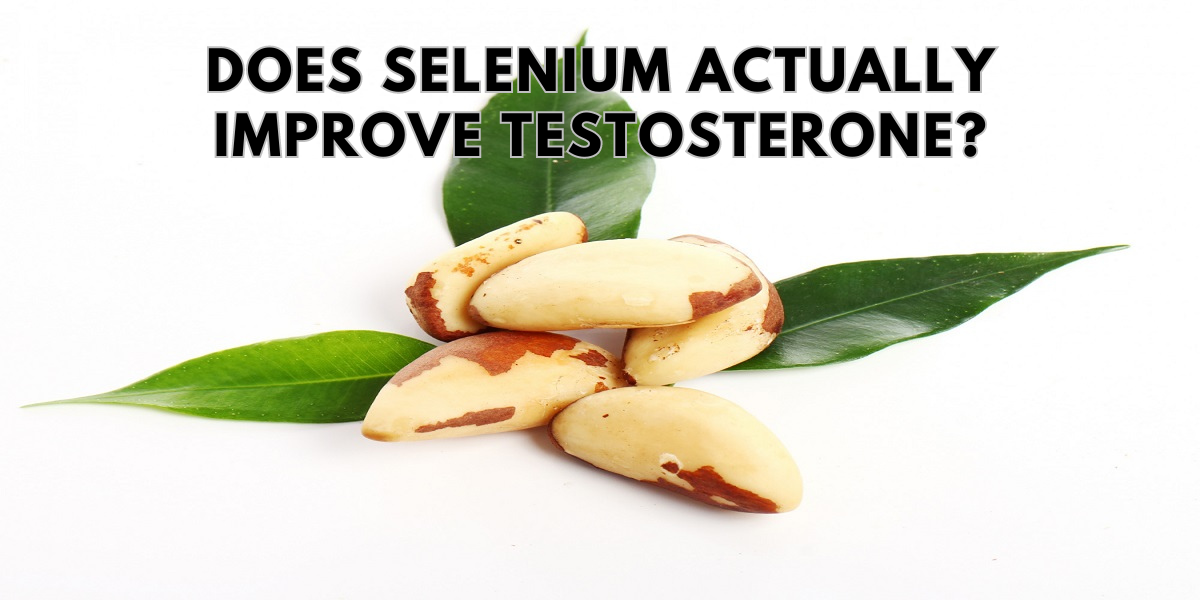Does Selenium Increase Testosterone Levels? Science To Know

Selenium, although not quite as popular as other nutrients, is a trace mineral that is integral to nutritional needs. It is associated with many positive contributions to health and one of the significant ones is testosterone health and sexual wellness.
Studies have shown that selenium, along with other vital nutrients, has the potential to increase testosterone output. This is one of the reasons why some of the top testosterone-boosting supplements have included this mineral in their ingredient blend.
This article will give you an insight into how selenium is correlated with testosterone boosting, what science-based studies say, and more.
Selenium And Testosterone: What Does Science Say

Selenium has a direct correlation with the male sex hormone because of which it is considered an important ingredient in numerous testosterone boosters. There are various clinical trials that have shown positive health results in association with selenium.
To begin with- one of the initial experiments done a while ago showed that selenium-deficient diet intake for a long time had a significant effect on spermatogenesis in male rats. The results concluded that this trace mineral is essential for increasing testosterone synthesis and improving sperm health.
Later, after a few years, another study was conducted on a much larger scale and on men as the subjects. The study involved more than 450 men who had fertility issues. After a 26-week selenium and N-acetyl-cysteine supplementation without any other treatment, it was recorded that there was a significant rise in serum testosterone in the subjects and the quality of semen had also significantly improved. This study supported the fact that Se can be used in male fertility treatments.
Some of the most recent journals published around 2019 and 2020 advocate that there is a positive correlation between selenium and male hormone response.
For example, one of the studies was conducted to strengthen the past evidence with their present findings on selenium and testosterone. Aside from the importance of selenium, it showed that the compound selenoproteins are responsible for the mineral’s biological activities like enzymatic reactions or its antioxidative property.
Now, so far you looked through some of the research journals showing a direct relationship between testosterone and selenium. But, it is important to note that this essential mineral can not just influence hormone health directly but also opens various pathways which are proven to be impactful in testosterone biosynthesis.
For instance, a research study from 2020 on ‘The Role of Selenium Mineral Trace Element in Exercise’ found that selenium’s antioxidant nature is capable of improving athletic performance and post-workout recovery. This supports more workouts and accelerated muscle gains which are crucial in testosterone production.
Selenium With Other Minerals

While digging through the various research journals surrounding the effects of selenium on testosterone, we found quite a few studies that show a close bonding of selenium with other minerals. These groups have found that minerals like zinc, magnesium, and copper when combined with selenium, maximize their efficacy. The reason is – these micronutrients are known for their significant positive influence on testosterone synthesis.
The research was conducted in recent years to evaluate whether the effectiveness of magnesium, zinc, and selenium on anabolic hormones is more when used individually or when in combination. Their findings state that these minerals, when used in combination, tend to raise testosterone significantly which in turn helps improve sexual function. It also indicated that it might be useful in treating low testosterone issues in aging men.
It is important to note that supplementing these minerals – zinc and selenium, individually, or combined, may be more effective in an active state than when resting and also, depending on the intensity and type of exercise you do.
A study was conducted in 2011 on the impact of zinc and selenium intake on testosterone response on a group of cyclists who took zinc and selenium supplements for a month. The total and free testosterone was studied before and after an intensive exercise session and the results were clear. While no significant changes were noticed at the resting state, there was a noticeable rise in testosterone levels among the athletes post-exercise.
There is yet another recent finding from a 2022 research study on the ‘association of copper, zinc, and selenium on sex hormones’. It is based on the data from the 2013-2016 National Health and Nutrition Examination Survey involving young participants whose age range between 6-19 years.
The research established that selenium has a direct influence on testosterone and was inversely related to sex hormone-binding globulin (SHBG). This means that the mineral has the potential to separate the free testosterone from SHBG thus increasing the bioavailability of testosterone. While zinc improved testosterone in male adults, it was inversely associated with testosterone in female teens. Copper, on the other hand, had a reverse impact on Testosterone but positively influenced SHBG (which contradicts the earlier mentioned study).
All these findings listed above show that while selenium does have a role to play in improving testosterone production, this nutrient can deliver optimum results when incorporated in combination with other testosterone-boosting micronutrients, particularly zinc, and magnesium.
Conclusion
From all the aforementioned scientific evidence, it can be concluded that Selenium has a synergistic relationship with the male sex hormone – testosterone. Aside from that, this mineral benefits the body in multiple different ways.
However, it is worth noting that the efficacy of selenium on testosterone response may vary among men depending on their individual health conditions, nutrition intake as well as lifestyle choices. As concluded by one of the research findings – selenium was seen to raise testosterone levels significantly after an intense workout session.
Finally, the best results of selenium can be seen when combined with other potent nutrients like zinc or magnesium. This is why, many testosterone boosters, in recent years, have started including the combination in their formula to increase their efficacy.
